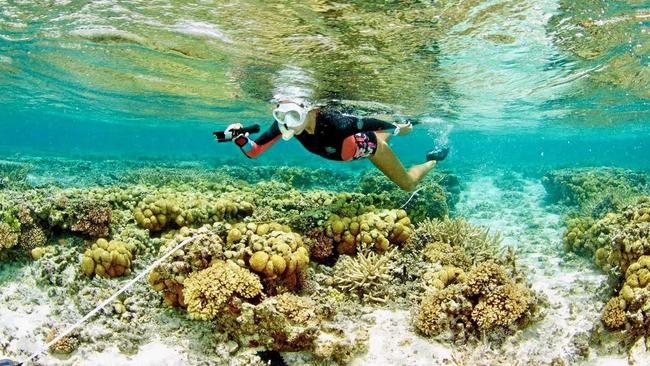SCU scientist discovers remarkable coral reef recovery
THE island is a scientific permit zone-only area, with limited human impact.

Lismore
Don't miss out on the headlines from Lismore. Followed categories will be added to My News.
LARGE portions of the Great Barrier Reef have experienced devastating coral decline, but an SCU scientist has discovered there is one island bucking the trend.
Research from Southern Cross University doctoral researcher Kay Davis shows One Tree Island, near Gladstone - in the southernmost neighbourhood of the Great Barrier Reef - has experienced remarkable coral growth.
Ms Davis said the findings were "completely unexpected" and showed a coral ecosystem calcification increase of 400 per cent between 2014 to 2017.
Her team analysed the chemistry of water samples to measure whether coral and algae were growing or declining and at what rate, to determine how the ecosystem compares to previous studies conducted in the 1970s and throughout the 2000s.
The new research, published this month in Frontiers in Marine Science open-source journal with Ms Davis as the lead author, is titled Fifty Years of Sporadic Coral Reef Calcification Estimates at One Tree Island, Great Barrier Reef: Is it Enough to Imply Long Term Trends?
Ms Davis said a devastating cyclone hit the One Tree Island reef in 2009, and no metabolic recovery was detected even five years after.
"We found that the coral ecosystem has completely recovered from this cyclone event after eight years," Ms Davis said.
"Not only did our water chemistry results show that calcification was recovering, but there was a visible increase in the amount of coral as well, with coral cover increasing to 30-40 per cent. However, we are still seeing an increase in organic productivity as well, which should continue to be monitored in the future.
"One Tree Island is a special case because it is a scientific permit-zone only, with limited human impact from runoff, accidental coral damage by tourists, and impact from boats. This could be part of the reason the reef has recovered so quickly."
Kay Davis teamed up with other researchers for a similar research trip to Lizard Island on the northern end of the Great Barrier Reef.
Ms Davis says Lizard Island is experiencing 'total ecosystem collapse'.
In March this year, Kay Davis was awarded Southern Cross University's International Women's Day Scholarship for her outstanding research.


